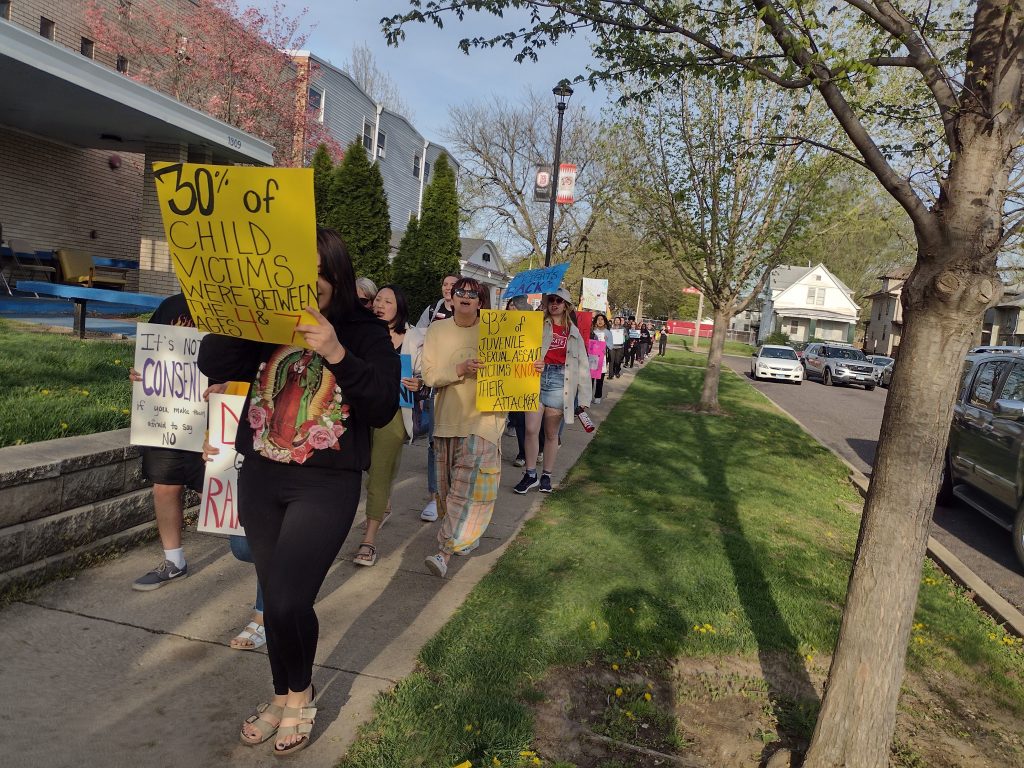One in four women on college campuses experience sexual violence. The feminist club S.H.E. Speaks and the Women and Gender Studies (WGS) Department held a Take Back the Night March to bring awareness to survivors and resources for sexual assault on campus.
Affiliate WGS instructor Natalie Jipson encouraged her students to organize this march after seeing similar demonstrations held at other institutions. Take Back the Night is a worldwide foundation aiming to stop sexual violence with chapters in universities all over the country.
“We have a lot of events here at Bradley for Sexual Assault Awareness Month, but there hasn’t really been an activist event,” Jipson said. “Something where people can express being frustrated and the types of changes that they want.”
Attendees did express their frustration by marching through campus and down Fredonia Avenue chanting slogans such as “Shatter the silence. Stop the violence.” and “Bradley unite, take back the night.”
Fredonia Avenue was included on the path because of its many fraternity and sorority houses. Sophomore Kylie Kruis spoke as a representative of Greek life, discussing the phenomenon of groupthink within fraternities and sororities.
“Group mentality means that some people that have been sexually assaulting people on campus, their images are not tainted,” Kruis said. “Because the fraternity and sorority will not talk out against those people because they believe that they are part of a family.”
Kruis also suggested a solution to the dangers of fraternity parties. A majority of sororities have bylaws that make them “dry houses,” which means that no alcohol can be served or consumed at registered events. In order to drink with friends, women end up going out to fraternity parties.
“I believe that if more sororities were allowed to host parties and more fraternities were called out for their actions, this would create better environments for people that are going out to just have a good time,” Kruis said.
While victims may be unwilling to file formal complaints that would result in consequences for the accused, the mental health consequences of experiencing assault can be debilitating. More than half of sexual violence survivors experience post-traumatic stress disorder (PTSD) more than six months after the event.
“Bradley should crack down more on the questionable behavior that occurs in the various fraternities on campus, especially at parties,” attending freshman psychology major Nadine Terreno said. “Reports of sexual violence or violence of any kind warrant shutting down their activities while a thorough investigation is conducted.”
A representative for the Bradley Counseling Center reminded students that it is a fully confidential service and paid for by the Health Fee, which means there is no additional charge for students.
President of Active Minds, Gabi Necastro, spoke as well to encourage students to utilize the counseling service.
“When it comes to sexual assault or sexual violence [PTSD] is a completely normal response,” Necastro said. “Do not feel ashamed for it.”
The last speaker of the event was 79-year-old alumna Linda Bolliger, who graduated in 1973 with a masters in sociology and counseling psychology. She has been a women’s rights activist since her time at Bradley.
“I’m proud of you at Bradley University, carrying on the work that some of us started in the 60s and 70s,” Bolliger said. “And damn, isn’t it a shame that we still have to do it.”





